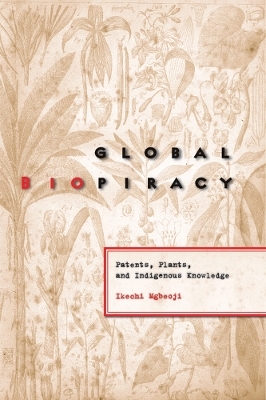
Global Biopiracy
Patents, Plants, and Indigenous Knowledge
Seiten
2005
University of British Columbia Press (Verlag)
978-0-7748-1152-1 (ISBN)
University of British Columbia Press (Verlag)
978-0-7748-1152-1 (ISBN)
- Titel z.Zt. nicht lieferbar
- Versandkostenfrei innerhalb Deutschlands
- Auch auf Rechnung
- Verfügbarkeit in der Filiale vor Ort prüfen
- Artikel merken
Legal control and ownership of plants and traditional knowledge of the uses of plants (TKUP) is a vexing issue. The phenomenon of appropriation of plants and TKUP, otherwise known as biopiracy, thrives in a cultural milieu where non-Western forms of knowledge are systemically marginalized and devalued as "folk knowledge" or characterized as inferior. Global Biopiracy rethinks the role of international law and legal concepts, the Western-based, Eurocentric patent systems of the world, and international agricultural research institutions as they affect legal ownership and control of plants and TKUP.
The analysis is cast in various contexts and examined at multiple levels. The first deals with the Eurocentric character of the patent system, international law, and institutions. The second involves the cultural and economic dichotomy between the industrialized Western world and the westernizing, developing world. The third level of analysis considers the phenomenal loss of human cultures and plant diversity. Exhaustively researched and eloquently argued, Global Biopiracy sheds new light on a contentious topic. The impact of intellectual property law on indigenous peoples and informal or traditional innovations is a field of study that currently includes only a handful of scholars. Biopiracy will be an invaluable resource for students, teachers, and legal practitioners.
The analysis is cast in various contexts and examined at multiple levels. The first deals with the Eurocentric character of the patent system, international law, and institutions. The second involves the cultural and economic dichotomy between the industrialized Western world and the westernizing, developing world. The third level of analysis considers the phenomenal loss of human cultures and plant diversity. Exhaustively researched and eloquently argued, Global Biopiracy sheds new light on a contentious topic. The impact of intellectual property law on indigenous peoples and informal or traditional innovations is a field of study that currently includes only a handful of scholars. Biopiracy will be an invaluable resource for students, teachers, and legal practitioners.
Ikechi Mgbeoji is a professor at Osgoode Hall Law School, York University, and the author of Collective Insecurity: The Liberian Crisis, Unilateralism, and Global Order, also published by UBC Press.
Foreword / Teresa Scassa
Preface
Acronyms
1 Introduction
2 Patents, Indigenous and Traditional Knowledge, and Biopiracy
3 Implications of Biopiracy for Biological and Cultural Diversity
4 The Appropriative Aspects of Biopiracy
5 Patent Regimes and Biopiracy
6 Conclusion
Notes
Selected Bibliography
Index
| Erscheint lt. Verlag | 8.11.2005 |
|---|---|
| Verlagsort | Vancouver |
| Sprache | englisch |
| Maße | 152 x 229 mm |
| Gewicht | 600 g |
| Themenwelt | Recht / Steuern ► EU / Internationales Recht |
| Recht / Steuern ► Wirtschaftsrecht ► Urheberrecht | |
| ISBN-10 | 0-7748-1152-8 / 0774811528 |
| ISBN-13 | 978-0-7748-1152-1 / 9780774811521 |
| Zustand | Neuware |
| Haben Sie eine Frage zum Produkt? |
Mehr entdecken
aus dem Bereich
aus dem Bereich
Gesetz gegen den unlauteren Wettbewerb, Preisangabenverordnung, …
Buch | Softcover (2024)
dtv Verlagsgesellschaft
16,90 €
Textausgabe zum deutschen, europäischen und internationalen Patent-, …
Buch | Softcover (2023)
dtv Verlagsgesellschaft
17,90 €


